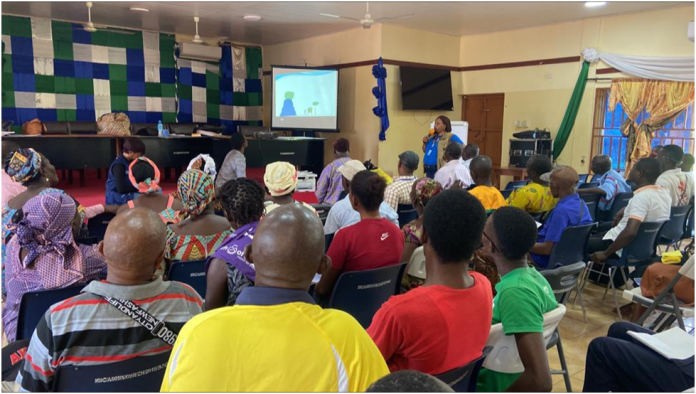In collaboration with the Environmental Protection Agency (EPA), the Ministry of Fisheries and Marine Resources (MFMR), the Institute of Marine Biology & Oceanography (USL-IMBO), and the National Tourist Board (NTB) and with funding support from the United Nations Development Program (UNDP), the National Disaster Management Agency (NDMA), on the 20th June 2022, commenced on the implementation of a five-year GEF funded project titled: “Adapting to Climate Change Induced Coastal Risks Management in Sierra Leone”.
The Project, it was understood, is aimed at strengthening the ability of coastal communities to systematically manage climate change risks and its impacts on the physical infrastructure and economic livelihoods through the use of Community-Based Early Warning Systems (CBEWS) which is based on “people-centered” approach through the empowerment of individuals and communities that are threatened by hazards to act sufficiently and effectively in order to reduce the possibility of injury, loss of life, damage to property, environment, and loss of livelihood.
The four (4) coastal communities in which the project is being implemented are Konakridee – Kaffu Bullum Chiefdom, Port Loko District; Shenge – Kagboro Chiefdom, Moyamba District; Turtle Island – Dema Chiefdom, Bonthe District and Tombo, Western Area Rural District in Sierra Leone.
While welcoming the participants and guests on behalf of local leaders, the Chiefdom Speaker of Kayamba Chiefdom, Moyamba District, Chief Abu Bendu Mboyawa mentioned that Shenge Island is degrading due to natural and human activities. “All that we are seeing now in Shenge Island are Early Warning signs of disaster. Only our attitude and activities can avert disasters, especially those we can control,” he commented.
During his presentations both at Konakridee – Kaffu Bullum Chiefdom in Port Loko District and Shenge – Kagboro Chiefdom in Moyamba, NDMA’s Director of Risk Reduction & Preparedness, Thomas A. Lebbie stated that the training will provide communities, practitioners, and organizations involved in disaster risk management with advance information and techniques that can be readily translated into prevention, preparedness and response actions. “This training will give you the skills and knowledge about hazards, threats, and vulnerabilities in communicating messages on disaster prevention, mitigation, and response,” he disclosed.
Whilst thanking NDMA and partners for organizing the training and inviting selected Councilors whose wards are currently experiencing severe consequences of man-made disaster, the Councilor of Ward 235 in Main Port Loko, Abu Bakarr B. Kanu noted that; “When we were young, we use to get shrimp and fish for our households from the Bankasoka river. It was an attractive breeding ground for fish and shellfish. We hope with this capacity-building engagement, we can now pass on the message to our people to start practicing adaptation mechanisms and move away from illegal fishing practices,” he added.
It was learned that the training will continue in the remaining two targeted coastal communities in a bid to close the knowledge gap in managing hazards within their communities.




